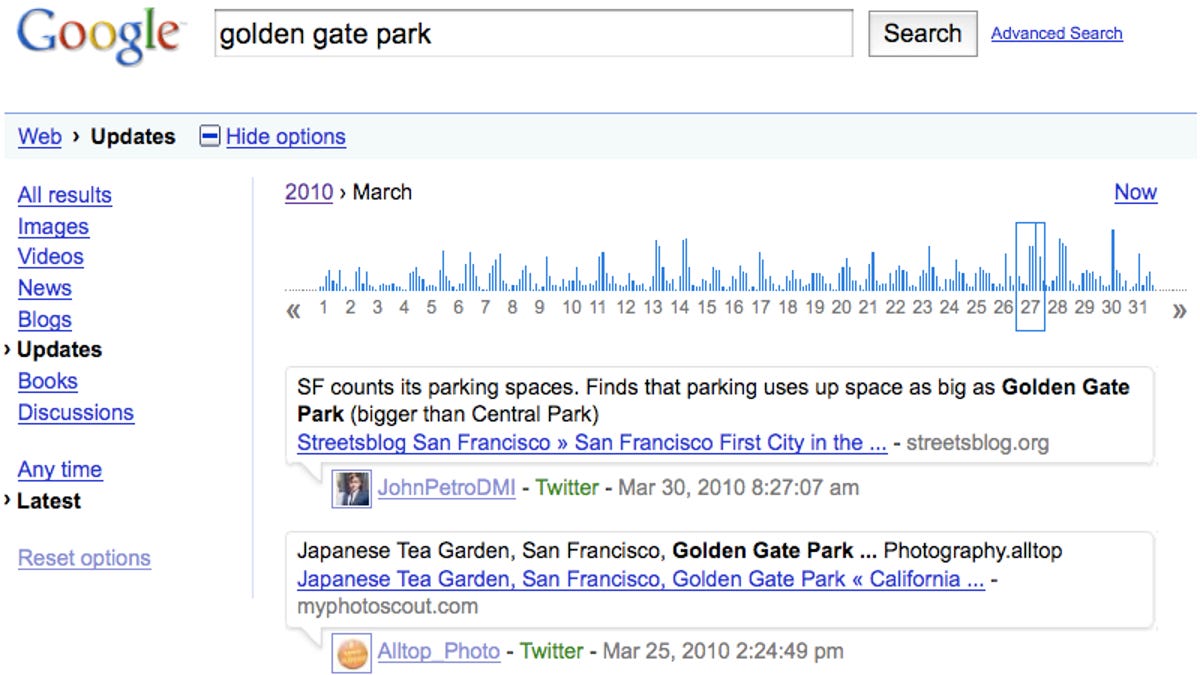Google launches Twitter timeline search
Over the next few days Google searchers will see a timeline of Twitter activity atop search results pages and will be able to click on spikes in tweets to see what was going on that day.

Updated 7:48 a.m. PDT with additional details, and at 8:18 a.m. following a conversation with Google.
Almost everything you've ever said on Twitter is about to be discoverable through Google.
Google announced plans Tuesday to roll out a timeline of archived Twitter messages organized by topic, allowing searchers to see when Twitter activity spiked with tweets related to their search query. When the user clicks on a particular day that contained an outsized number of tweets related to that topic, they'll be presented with a scrolling list of the individual tweets from that day.
It's sort of like the timeline search feature that Google rolled out several years ago, only for tweets. Searchers will be able to start at "right now" at the far right-hand side of the timeline and scroll back through time by moving to the left.
"The conversation to date has been about what's happening right now," said Dylan Casey, a product manager at Google overseeing the project. But now, searchers will be able to find tweets related to something that happened in the past, at both a national news level and at a local event level. "This kind of archival experience around content is something we're not new to."
It's not complete yet: Google said only tweets going back to February of this year will be available at launch over the next few days. But the plan is to eventually surface tweets as far back of March 2006, when Twitter made its debut.
Google's bid to organize the real-time Web kicked off in earnest last December, when it announced real-time search. Twitter isn't the only component of the real-time Web--which includes things like status messages and microblog posts--but search experts agree that it's certainly the biggest part, and harnessing the "firehose" of Twitter content has proved a daunting task to date.
Twitter operates its own search page, but the results are grouped either around the trending topics of the day or simply blasted at the searcher as people post Twitter updates minute by minute. Twitter also lets users see an archive of their last 3,200 tweets, but for some people that's maybe a couple of weeks at best, and there's no good way to search that archive for particular topics.
So, what happens when that embarrassing tweet from April 2007 shows up in Google search results for "shotgunning beers" attached to your name? Casey said that Google is only displaying publicly available tweets, so if a Twitter user goes back and deletes a particularly mortifying post, it won't show up in search results.
However, it's less clear how Twitter users will be able to purge tweets that fall outside the 3,200-tweet archive limit. Google allows Web publishers to flag content meant to be private if it appears in search results, and Casey said although Google doesn't have something like that available at the moment for this feature, it's working on something similar.
Updated 12:08 p.m.: Google figured out how users will be able to delete old tweets: even if they don't have access to that tweet through their own archive, when they find it in Google search, they'll be able to click on as the registered author of that tweet and delete it through Twitter.
Twitter is holding its first developer conference this week in San Francisco.